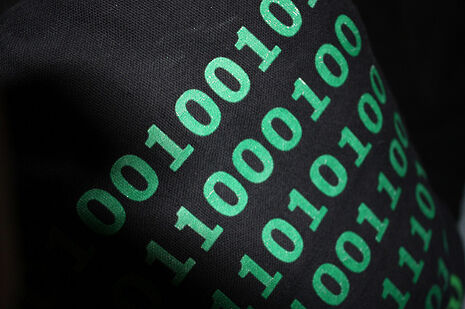‘What are you?’
Gabrielle McGuinness talks about being mixed race

'So, ummmm…what are you?'
'I’m sorry, what?' I say.
'Like where are you from.'
'Oh! I’m British', I’ll reply enthusiastically, trying to end the conversation there.
'No, I mean where are you really from?'
'Oh, well I was born in London but my family moved to Reading so we live there now even though it’s a bit crap.'
'No, I mean where, like, in the world.'
'Not really sure since Brexit happened, so let’s say Europe,' I utter angrily this time.
'No, as in where are your parents from?!'
I’ll pause and hesitantly proceed: 'Right, so I’m half Irish and then half Guyanese, which is a Caribbean country but in South America but technically my family is of South Asian origin cos the Caribbean is a whole lot more racially diverse than people think and…'
I’m sure this kind of exchange is familiar to a lot of mixed-race people. I normally try to delay telling people for as long as I can but there comes a point where you just have to cave. I added in the bit about being South Asian to spare everyone else the embarrassment when they ask something like “if you’re Caribbean then how come you’re not darker?” Comments like these really show the flaws in the British educational system: students spend most of their years learning about Tudor kings, the rise of the Nazis, Britain’s home front and Ancient Egypt but literally nothing about the history and cruelty of the British Empire and the waves of migration to the UK.
"I can see them scour every crevice in their brain for a binary that fits. But they can’t."
But the bit that’s always hurts me the most lies in the first question, the ‘what’ in ‘what are you?’ Saying ‘what’ turns me into an object or a thing rather than a human just because I’m not instantly categorisable. It’s like saying: 'you’re not black; you’re not white; I don’t think you’re a tanned European; and you could be Asian but I’m not sure whereabouts...' I can see them scour every crevice in their brain for a binary that fits. But they can’t.
People are not overtly racist, but the things people say just confirm to me that I am slightly ‘other.’ Not fully white. Some say that they wish they had darker skin because it would be great alternative to their white skin, which burns too easily. Or that they’re jealous since they have nothing ‘interesting’ or ‘exotic’ about their racial heritage. Or, that they wished they were mixed-race because it’s much more fashionable than plain old Anglo-Saxon. It is as though I am palatably foreign: my ‘otherness’ muted by glimmers of whiteness. Perhaps it’s an attempt to show that my race isn’t an issue, but all it does is push me slightly outside of the borders of white privilege. It makes you feel like the wrong jigsaw piece that won’t quite slot into Western beauty ideals or codes of behaviour.
When I was little it was something my heritage became something I was ashamed of. My family moved from London to a predominately white area of Oxfordshire and I had to deal with some cutting remarks about my skin colour that stuck with me, especially since my race never felt like it defined me before. So I learnt to play up to my white side and not bring my foreignness to the fore. This sense of sticking out in the playground never fully disappears.
But over the years I have learnt to work with the tools I have: the feeling of never quite fitting in becomes an asset. There might never be a room where the people around me feel totally familiar, but I have learnt to be proud of what my difference can offer when it comes to adapting to various situations. Sometimes it would feel as though I couldn’t speak up because the voice of social conditioning told me I couldn’t be offended by something I was ‘half feeling’. But if something makes you feel excluded then you have the right to feel upset. Historically, society has insisted on seeing everything, race included, through binaries. Being mixed-race disrupts this idea, which previously made it feel as though there wasn’t a space for me. I viewed myself as two disparate halves or, even worse, I used to publicly hide that racially ‘other’ side of me out of fear of judgement. But I know now to insist on my wholeness.
One part of me includes the time spent during my childhood in my Grandma’s garden waiting for the jerk chicken on the BBQ to cook whilst we listened to soca and my mother’s family reminisced about growing up ‘back home’, discussing who moved to Queens or who was now in Florida and whether we should go back to visit Guyana some time soon. Another side is that which listens to old rock music and discusses English poetry or the nuances of some 'Guardian' article over a glass of Sauvignon Blanc. These two bits are not two different people, they exist simultaneously and should be celebrated, not forgotten or fetishised. Instead of feeling deprived of a voice in society it is important to own the power my identity gives me.
 News / Cambridge academics sign open letter criticising research funding changes22 February 2026
News / Cambridge academics sign open letter criticising research funding changes22 February 2026 News / Student and union protesters hold ‘Trans Liberation Solidarity Rally’ 24 February 2026
News / Student and union protesters hold ‘Trans Liberation Solidarity Rally’ 24 February 2026 News / Union speakers condemn ‘hateful’ Katie Hopkins speech14 February 2026
News / Union speakers condemn ‘hateful’ Katie Hopkins speech14 February 2026 Features / Beyond the porters’ lodge: is life better outside college?24 February 2026
Features / Beyond the porters’ lodge: is life better outside college?24 February 2026 Theatre / Footlights Spring Revue? Don’t Mind if I Do!25 February 2026
Theatre / Footlights Spring Revue? Don’t Mind if I Do!25 February 2026








